Before picking up Nisekoi, I've been warned that it's "the endless shounen battler" of Romantic Comedies, that it's ongoing, for hundreds of chapters, and rather than ever coming closer to any form of closure, things keep going on and on, with "more of the same" of romantic hijinks, and sweet nothingness.
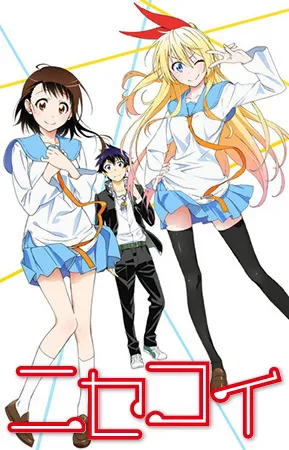
"Cool!" I said, since I like RomComs, and RomComs are very much about getting the same thing over and over, show after show, and even within a show, all these moments of almost confession, of almost-kissing, just for that moment of sweet release in the end, right? Well, sometimes too much of a good thing, especially when it's predicated around drawing things out before giving us the release of a couple finally coming together. When your whole work is built around it not happening, well, that sort of takes a lot of the fun out of it.
I find Nisekoi a useful and interesting series to use in order to look at and consider some aspects of Romantic Comedies (RomComs), in general, in anime, and of the "harem" sub-type in particular.
(This is not a review, but more a discussion of the show and of ideas that have risen in my mind as I’ve watched it. There will be some spoilers.)
Harem RomComs Don't Have "Harems":
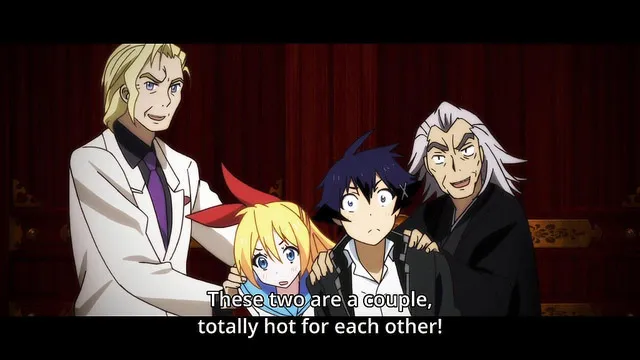
Most so-called "Harem Romances" don't actually have harems. I've discussed this in my Seitokai no Ichizone (School Council Discretion) piece, where I discussed why visual novels are set up the way they do - sequential monogamy, so to speak. You have a "harem" of girls to pick from, but you only get to pick one girl at a time, and you basically need to play the game again if you want to hook up with a different girl, sort of like real life, eh?
Likewise, most "Harem Romances" seem to work under the impression that you have one, or very few males, and many females, each of which caters to a different sort of personality or fetish, and all of which are supposedly potential romantic interests. You can even see that in the first half of Steins;Gate, which weirded me out when I first watched it, as I was expecting a pure sci-fi drama/thriller.
So, "Harem Romances" are about a male surrounded by girls, and supposedly all of them being valid picks, but they're valid picks for the audience, they often don't actually make sense within the show. Let's look at Haganai (Boku wa Tomodachi ga Sukanai / I Don't Have Many Friends) as an example. Supposedly we have 5 applicable girls, once we remove the younger sister and her grade-schooler friend, who actually spend real time with the main character. But looking at it more in-depth, it's a love-triangle, with only two girls that have a real shot at Kodaka, because they care for him romantically, and he cares for them in such manner.
Everyone else is just a "hanger-on", such as Rika. They might have feelings, but they're rejected. They're just there to keep things interesting. Similarly, in Nisekoi, just look at the premise, "Boy has to fake being in a relationship with a girl he dislikes so their mobster families won't go to war." How many girls do we really have here? One. But then we see there's another girl he likes, and we hear of a childhood promise, so we have two girls. How many more girls are introduced as "potential love interests" within the show's 20 episodes (we're ignoring the manga here)? We get to a total of 4 such girls, and then we have Ruri and Onodera's mother as "Non-issue girls".
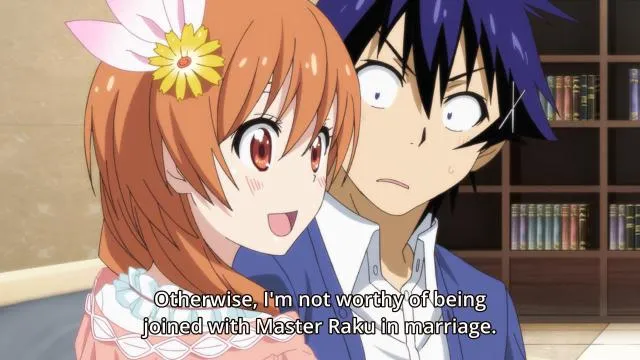
But those non-issue girls are part of what is the "issue". Ruri isn't really there to be with Raku. Onodera's mother? Certainly not. But they're there as "stereotype-filling entities", and because in a harem romance any girl is an "option" for merely talking to the male main character, those two are often drawn in as well (and teacher characters in other series, sadly).
But even of the four girls, how many are "real candidates"? Two. Onodera is the girl Raku admits to liking, and whom he makes moves to get closer to, and Chitoge is the girl from the premise, with whom he has to spend time. These are the only two girls who really get any real amount of screen-time, with it being more than one person who is not a main character pining after the other (Tsugumi) or acting and being rejected (Marika).
And even if we look at the "real candidates", this show is not even a love-triangle. Now, I'm going to be frank, my favourite girls in terms of design/personality are Tsugumi and Onodera. But as far as the show is concerned, Chitoge is the only real girl. Chitoge gets about 80% of the Raku-time for herself, and she gets to be actually developed as a person who changes, who makes progress, rather than being a one-note comic relief stereotype. As much as I like Onodera in principle, her scenes and episodes often feel as afterthoughts, just so we wouldn't forget this is supposed to be a harem show, rather than "Chitoge's show".
So, why do we even have all these other girls? Why do we have all this stuff?
Harems Aren't About Character Indecision, but Author Indecision:
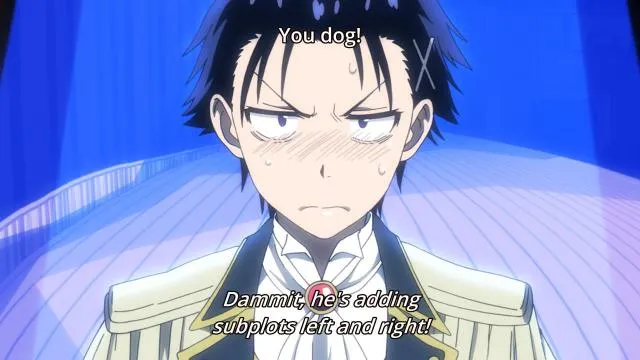
Nisekoi is once again a good way to talk about this issue that's apparent in all Harem shows to a degree. Nisekoi is supposedly one story, but when you take a closer look, it's like a Frankenstein's Monster resulting from mashing together the premises of several different stories.
"Raku and Chitoge are two heirs to mobster families have to fake being in a relationship so their families won't go to war. Problem is, they met one another earlier in the day and hate one another's guts! Follow as they have to put up appearances, but slowly grow closer together." - That's a show, right there. You can add another girl if you must, but you don't have to.
"A girl and a boy make a promise to be together when they're six years old. Ten years pass, and neither remembers the other's face or name. Join Onodera and Raku who like one another, but wish to remain loyal to their past promises, and then they discover each other had made a similar promise ten years ago…" Another show, right there. And then you can add someone else appearing with a similar promise, but no real reason.
And then we can have ye olde "Childhood friends, but now a new girl appears, who will he pick?" All of these are valid shows, the last one is similar to Haganai as well, and in both cases, the "Childhood Friend" is often given a "twist" where we discover "New girl is also a childhood friend! So now the childhood friend has nothing to make her special!" which of course brings to mind the question of whether or not being a childhood friend is truly enough to build a current relationship on (it's not, when you hadn't met in a decade). But that's another topic, though one that always annoyed me, with how Raku would always try to remain loyal to the girl whose name and face he doesn't recall, rather than focus on how he feels right now. Dammit.
So, what do we have in Nisekoi? An author that didn't decide which story he wants to tell, so he's telling them all at once. Harems are sort of the same situation with regards to girls. Think about the visual novel analogy, or perhaps origin, I've mentioned earlier. In a visual novel you're literally a serial monogamist, but what happens if you want to tell a story but can't pick which girl you want to focus on? The options are either to have several stories concurrently or one after the other, which takes a lot of time and effort, or create a story that straddles the realms, where all girls exist on the "Maybe"-level.
In other words, harems aren't merely where the characters can't decide which girl to go for, but where the author might not, or it wouldn't have ended with a harem to begin with. Yes, he might want to keep the audience happy, to have a girl for every possible member, but in actually giving them all time to be considered "contenders", even if only in our imagination, he has to keep presenting the issue as "open". As I noted above, in most cases it's obvious that not all girls are true contenders, but it is what it is.
Nisekoi is especially interesting in this regard, because one truly feels as if it's a mishmash of several rejected premises, or merely the inability to pick one. You know what else behaves in this manner, with an artificial insertion of new plotlines and just jumbling things up as you go along? Soap operas, which brings us to our final header.
Drawing Things Out Loosens Tension:
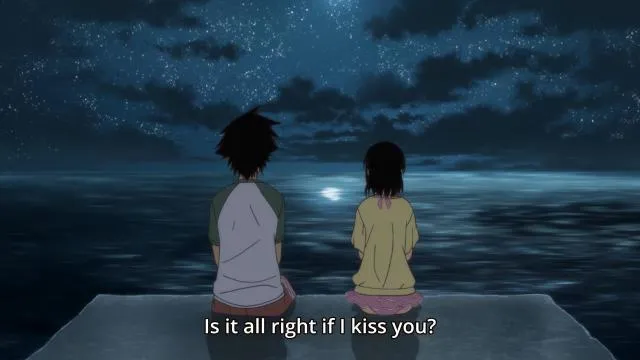
Imagine you have a spring toy. You stretch it, and then it snaps back. You stretch, and it snaps back. Over time, its elasticity drops. More than that, should you stretch it beyond a certain point, it will no longer snap back.
As I said earlier, going into Nisekoi I knew I'm not going to get any resolution, and considering many anime series these days do not conclude the story, I thought I'd be fine. I enjoy the "almost" moments, where someone wishes to confess, but end up stuttering and it not going through. Nisekoi went all-out on this front, including a moment where someone was willing to confess, for a baseball to come in through the window and ruin the moment.
Nisekoi is hardly the first anime to do so. In fact, there's very little that's at all original about Nisekoi, from its characters, to their interactions, to how the almost-confessions are handled. And yet, I still picked it up, not "in spite of" the above, but "because of". RomComs to me sort of inhabit this area, where everyone knows from the first minute how they will end, and the road going there is more or less identical between most shows and films (or falls into one of a handful or archetypes), and yet we watch one after the other, for those bittersweet moments, for the "Awww!" at the end.
But that requires there to actually be an ending. That requires there to be change, even if we know things will not get resolved. If one character tells another they like them, and then sort of takes it back, or one character hears another say they like them, even if somehow things get brushed under the rug, the interaction is still changed. Chitoge got to have such moments with Raku towards the end of the anime adaptation, where they had a fight, after which they couldn't help but admit the other matters to them, and Chitoge even went as far as to admit (but only to herself, of course) that it's love.
And yet, some moments in the series had me tearing my hair out. Onodera confesses to Raku, on the beach, but turns out he's asleep. Chitoge is right around the corner, so it's presented as if she could hear the confession, but in the end it turns out she didn't hear a word. So we've had a confession, and it's a mini-cliffhanger, but then it's taken back completely. Had Chitoge heard, it'd have at least shifted dynamics, but nothing came out of it.
But yes, Onodera confessed, but considering ever since the second or so episode we've known she liked Raku, both because she says so in her mind, and because she confessed to Ruri, her best friend, it wasn't a change in the circumstances, it didn't make me go "Yessss!" In other words, it wasn't a bitter or sweet moment that I was watching the show for, it became a symbol for how any and all progress isn't allowed to actually happen, and when something might disrupt the status quo, it's taken out.
You see, all those "twists" and new characters introduced? They're not introduced in order to disrupt the status quo, they're there in order to maintain it. How is that possible? Because it's important to realize what the actual point in contention is, what's at stake, and what's at stake is Raku forming a relationship with any of the girls.
Raku close to confessing to a girl, or realizing he likes her, or she likes him? Quick, introduce a new character, or have him spend time with an older character, or introduce how an old character might be the girl he made the promise with a decade ago! Why? So nothing would change. They keep adding new girls, but those new girls aren't a method to change the status quo of Raku and his harem, they're a way to extend it, but so you won't notice how it's the exact same thing, replicated with another trope-fulfilling girl.
Soap operas keep the mess up, but they give you endless small resolutions. We watch all those RomComs, which run the same and end the same, but we do so for the final resolution, we do so for the moments things always progress, or take a step back, but at least they change. That seashore confession to Raku by Onodera became a symbol of how much Nisekoi isn't willing to change things up.
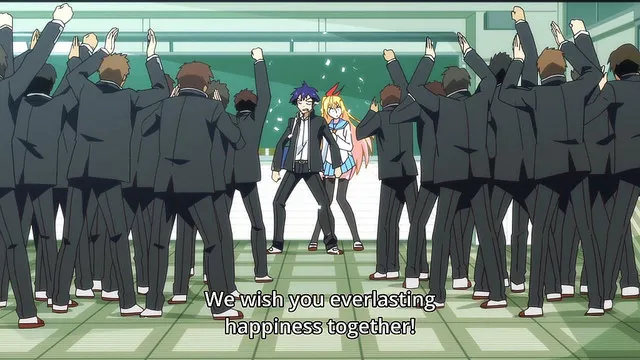
At least we've got Chitoge. In the final episode or so, she finally admitted to herself that she likes Raku. We knew she liked him from around episode 4-5, and knew she will like him from the very first episode. But even so, her admitting to like him, while a change, and a good "Yes!" moment for us watchers, isn't actually a change in the world of the series, but merely the promise of one. You end a series with a promise being fulfilled, not made. Then again, series are usually over with a couple admitting to actually liking one another and becoming a couple, which is nothing but a promise at a future, and the series end there so the promise could not be sullied.
But poor Chitoge, your "promise" was the one a series is predicated upon, full of tension, not a place to end a show. But I guess when a show is determined to keep things running as long as possible, which demands a constant infusion of "non-progress", you take what you can, eh?
I like Nisekoi, I found it an entertaining show for the most part, filled with an endless amount of reaction faces, some over the top "Shaftisms" (Akiyuki Shinbo's signature touch) which detracted from the show but became a non-issue after episode 5 or so. It was well acted, and I liked most characters aside from Marika. It also had an unfortunate couple of episodes where things were barely animated or drawn, and another where the fanservice levels hit the ridiculousness threshold. Did it give us what it said on the cover? Yes. Did it give me everything that I wanted? No, sadly not.
Even if people tell you what you're going to get, you'll still hope for more. And that is the promise behind "Harem RomComs", keeping the impossible dream alive, within your head, even when nothing really supports it, except more non-content, to keep said dream alive.
You can read my episodic notes for the series here.
Question: What do you think of so-called Harem RomComs in general?
Check out my latest entries:
- So You Want to Watch Anime? Here are Ten Shows to Help You Get Started
- Shirobako – On Cynical Optimism
- What Makes Social Networks the Worst Place to be While Depressed?
All the images in this post were made for promotional purposes and/or fall under the jurisdiction of fair use.
This post has originally been posted on my blog here, and has been reformatted and updated as needed for Steemit. You can verify I am the blog owner by scrolling to the bottom of the right sidebar.